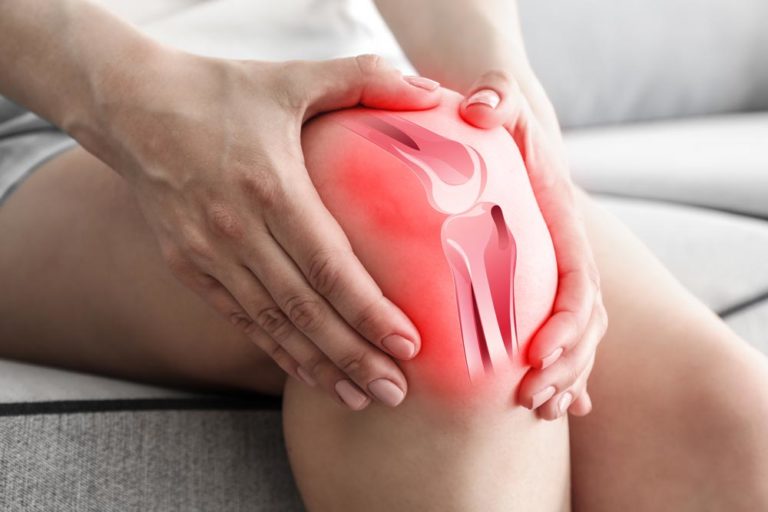Inflammation
Medical Studies on Pregnenolone – Inflammation

Pregnenolone possesses powerful anti-inflammatory properties − a fact that has been known for decades − and supports the maintenance of immune homeostasis in various inflammatory conditions. It also plays a key role in many autoimmune concerns, for example, rheumatoid arthritis and multiple sclerosis (MS).
Proven for Inflammatory Joint Concerns
Since the 1940s, pregnenolone has been used successfully to promote healthy joints in instances of inflammatory joint concerns, including those with an autoimmune component, such as rheumatoid arthritis. Pregnenolone also helps relieve symptoms of osteoarthritis and can facilitate a delay in its progression. Pregnenolone is often better tolerated than other measures and standard treatments, as these are often accompanied by side effects such as high blood pressure or osteoporosis.
Anti-Inflammatory Mechanisms of Pregnenolone
According to studies, one aspect of the anti-inflammatory effect of pregnenolone appears to be related to glucocorticoids, specifically the immunosuppressive glucocorticoid receptor. However, pregnenolone is also capable of suppressing the inflammatory response via its own mechanism, independent of the receptor. In this respect, pregnenolone suppresses pro-inflammatory signals that can be mediated via microglial cells through the Toll-like receptor (TLR).
Medical Studies on Pregnenolone – Inflammation
CLICK-enabled analogues reveal pregnenolone interactomes in cancer and immune cells
2021-04 Roy S, Sipthorp J, Mahata B, Pramanik J, Hennrich ML, Gavin AC, Ley SV, Teichmann SA
Pregnenolone (P5) promotes prostate cancer cell growth, and de novo synthesis of intratumoural P5 is a potential cause of development of castration resistance. Immune cells can also synthesize P5 de novo.
BV-2 microglial cells respond to rotenone toxic insult by modifying pregnenolone, 5α-dihydroprogesterone and pregnanolone levels
2020-09 Avallone R, Lucchi C, Puja G, Codeluppi A, Filaferro M, Vitale G, Rustichelli C, Biagini G
Neuroinflammation, whose distinctive sign is the activation of microglia, is supposed to play a key role in the development and progression of neurodegenerative diseases. The aim of this investigation was to determine levels of neurosteroids produced by resting and injured BV-2 microglial cells.
Extra-adrenal glucocorticoid biosynthesis: implications for autoimmune and inflammatory disorders
2020-05 Slominski RM, Tuckey RC, Manna PR, Jetten AM, Postlethwaite A, Raman C, Slominski AT
Glucocorticoid synthesis is a complex, multistep process that starts with cholesterol being delivered to the inner membrane of mitochondria by StAR and StAR-related proteins.
The neurosteroid pregnenolone promotes degradation of key proteins in the innate immune signaling to suppress inflammation
2019-03 Murugan S, Jakka P, Namani S, Mujumdar V, Radhakrishnan G
Pregnenolone is a steroid hormone precursor that is synthesized in various steroidogenic tissues, in the brain, and in lymphocytes. In addition to serving as the precursor for other steroid hormones, pregnenolone exerts its own effect as an anti-inflammatory molecule to maintain immune homeostasis in various inflammatory conditions.
TSPO ligands boost mitochondrial function and pregnenolone synthesis
2019-01 Lejri I, Grimm A, Hallé F, Abarghaz M, Klein C, Maitre M, Schmitt M, Bourguignon JJ, Mensah-Nyagan AG, Bihel F, Eckert A
Translocator protein 18 kDa (TSPO) is located in the mitochondrial outer membrane and plays an important role in steroidogenesis and cell survival. In the central nervous system (CNS), its expression is upregulated in neuropathologies such as Alzheimer’s disease (AD).
Synthesis and cytotoxic effect of pregnenolone derivatives with one or two α,β-unsaturated carbonyls and an ester moiety at C-21 or C-3
2018-03 Chávez-Riveros A, Cruz Noriega A, Ramírez Apan MT, Miranda LD, Bratoeff E
Four series of pregnenolone derivatives having one or two α,β-unsaturated carbonyls and an ester moiety at C-21 or C-3 were synthetized to compare their cytotoxicity effect.
In vitro and in vivo effect of flutamide on steroid hormone secretion in canine and human inflammatory breast cancer cell lines
2018-03 Caceres S, Monsalve B, Peña L, de Andres PJ, Alonso-Diez A, Illera MJ, Woodward WA, Reuben JM, Silvan G, Illera JC
The aim was to study the effects of flutamide on cell proliferation, in vivo tumour growth and steroid production in canine and human IBC cell lines.
Synthesis and biological evaluation of heterocyclic analogues of pregnenolone as novel anti-osteoporotic agents
2017-03 Maurya SW, Dev K, Singh KB, Rai R, Siddiqui IR, Singh D, Maurya R
The structural modifications of pregnenolone have been described via the introduction of heterocyclic moieties at C-17 position by limiting the acyl group.
TRPM3 channel stimulated by pregnenolone sulphate in synovial fibroblasts and negatively coupled to hyaluronan
2010-06 Ciurtin C, Majeed Y, Naylor J, Sukumar P, English AA, Emery P, Beech DJ
Calcium-permeable channels are known to have roles in many mammalian cell types but the expression and contribution of such ion channels in synovial cells is mostly unknown. The objective of this study was to investigate the potential relevance of Transient Receptor Potential Melastatin 3 (TRPM3) channel to fibroblast-like synoviocytes (FLSs) of patients with rheumatoid arthritis.